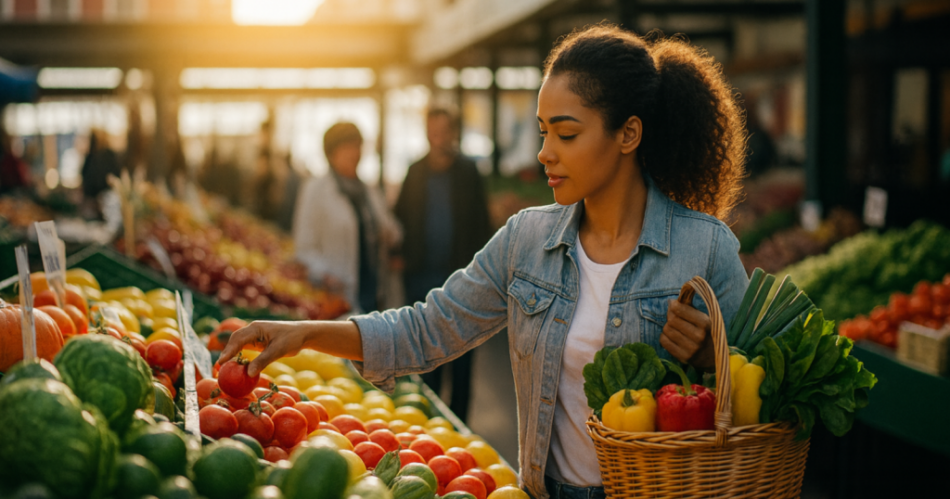Buying in bulk feels like the ultimate savvy move. You grab a giant container or a mega-pack, pat yourself on the back for saving money, and walk out of the store feeling like you’ve outsmarted inflation.
But sometimes, the deal isn’t really a deal.
Certain vegan foods—especially the ones with shorter shelf lives—don’t actually save you money when you buy them in massive quantities.
They spoil, lose freshness, or tempt you to overeat just so you don’t “waste” them. In the end, you wind up tossing more than you use.
I’ve learned this the hard way—standing at my fridge, holding a container of slimy spinach or a bag of rock-hard dates, realizing I basically donated money to the compost bin. If you’ve ever been there too, this list is for you.
Here are seven vegan foods that seem like a bulk bargain but often leave your wallet—and your fridge—regretting it.
1. Fresh greens
It’s hard to resist those jumbo clamshells of spinach, kale, or spring mix. They promise endless salads and smoothies, and the price per ounce looks fantastic compared to the smaller boxes.
But leafy greens are notorious for spoiling fast.
I can’t tell you how many times I’ve bought a bulk pack of spinach thinking I’d get creative—throw it in curries, pasta, even bake it into muffins.
A week later, I’d find a soggy pile of leaves that smelled faintly of swamp water. Suddenly that “deal” was just food waste.
Unless you’re cooking for a big household or running a café, most people don’t get through those greens before they wilt.
Freezing helps a little, but frozen spinach doesn’t replace the taste or texture of fresh. If you’re buying greens, smaller, fresher batches often cost less in the long run because you actually use them.
2. Plant-based milks
Have you ever seen those bulk packs of oat milk or almond milk and thought, jackpot? I have.
But unless you’ve got a family that goes through cartons daily, the savings can be deceptive. Plant milks have a shelf life, and once opened, they need to be consumed within a week or so.
Here’s the trap: you end up rushing to finish them. That means pouring giant lattes, drowning cereal, or adding extra milk to recipes just to use it up before it turns sour.
And let’s be honest, no one likes the taste of oat milk that’s starting to separate.
Buying one or two cartons at a time usually works better unless you’re hosting or know you’ll actually get through the stash. That way, you avoid both waste and the pressure to chug lattes like they’re going out of style.
3. Fresh berries
Big tubs of strawberries, blueberries, or raspberries look like a dream when you first bring them home.
The price per pound is so much cheaper than those little cartons, and it feels like abundance. The thing is, berries are fragile. They mold fast, bruise easily, and can turn mushy in just a couple of days.
I once bought a Costco-sized tub of raspberries, thinking I’d be eating antioxidant-packed breakfasts all week. By day three, half the container had grown little gray fuzz jackets.
I remember standing there, spoon in hand, scraping out the salvageable ones.
Unless you’re freezing them the day you bring them home, big berry hauls can feel more like a heartbreak than a bargain. A smaller punnet that you finish fresh is often the true money-saver.
4. Nut butters
A giant tub of almond or peanut butter looks like it’ll last forever—and technically, it can.
The problem? Freshness and portion control. Nut butters can separate, get stale, or even pick up an off taste if they sit too long.
And here’s the sneaky part: when you have an oversized jar sitting in the pantry, it’s easy to scoop out a little more than usual.
Before you know it, the tub’s half empty in a fraction of the time, and you haven’t really saved anything.
Nut butters are best enjoyed fresh and creamy. A smaller jar ensures you’re eating it at peak flavor—and keeps you from convincing yourself that “just one more spoonful” doesn’t count.
5. Vegan protein powders
This one caught me off guard. I once splurged on a bulk container of pea protein powder the size of a toddler.
I figured it would last months, and technically, it did. But by the time I was halfway through, I dreaded opening it. The flavor was chalky, the texture weird, and I was stuck with pounds of it.
That’s the hidden cost: commitment. If you haven’t tested a smaller size first, buying protein powder in bulk can mean months of choking down smoothies you don’t even enjoy.
And even if you do like it, the powder can clump or lose freshness after sitting too long.
When it comes to protein, it’s smarter to buy smaller tubs, rotate flavors, and keep your routine enjoyable. Otherwise, you end up wasting money on a giant container that doubles as a guilt trip every time you open the pantry.
6. Dates and dried fruit
Dried fruits seem like the perfect bulk buy. They last longer than fresh, and the big bags look so economical.
But here’s the catch: they’re sticky, clump together, and often dry out into chewy rocks before you can finish them.
I once had a five-pound bag of Medjool dates that started off soft and caramel-like. A few months later, they were hard enough to chip a tooth.
Sure, you can soak them to bring them back to life, but most people don’t bother—and the bag eventually gets tossed.
Smaller bags might look pricier per ounce, but they stay fresh and satisfying. And honestly, when the texture is right, you actually eat them more mindfully instead of racing to use them up.
7. Fresh herbs
Herbs are one of those things that make you feel fancy when you buy them in bunches. But unless you’re cooking daily with parsley, basil, or cilantro, those big bulk bundles go limp in the fridge almost immediately.
I can’t count the number of times I’ve opened my produce drawer to find what looks like a bouquet of sadness—herbs that started as vibrant green and ended as soggy mush. It’s a money sink and a motivation killer.
Buying smaller bunches, or better yet, growing a little herb pot at home, ends up being much more practical. You get what you need without the guilt of tossing half a bunch every week.
Final thoughts
Bulk shopping can feel like a smart move, especially when you’re plant-based and always looking for ways to stretch the budget. But sometimes, the foods that look like deals are really just traps in disguise.
Freshness fades, portions get skewed, and what looked like a bargain ends up costing more in waste and frustration.
I’ve learned to pause before grabbing the biggest bag or box and ask myself: Will I honestly finish this before it spoils?
If the answer’s no, I’d rather buy smaller and savor every bite. That’s the real win—not a giant tub of spinach that dies in my fridge before I even get to it.
What’s Your Plant-Powered Archetype?
Ever wonder what your everyday habits say about your deeper purpose—and how they ripple out to impact the planet?
This 90-second quiz reveals the plant-powered role you’re here to play, and the tiny shift that makes it even more powerful.
12 fun questions. Instant results. Surprisingly accurate.






